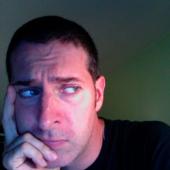Emotiolitical 08/15/2011 9:01pm
Editorial
During our chat about politics, art, and activism, writer Sarah Wash said something that shook me up. She suggested there may be far more sociopaths in the world than we realize. In other words, the people who don't care much about other people may very well outnumber those who do. She cited specific examples she'd run across in her own employment history as well as things she'd read, trends she'd noticed, etc.
It stopped me in my tracks. Are we losing our capacity for empathy? Are life, liberty, and the pursuit of happiness for the individual more important than the well-being of the society as a whole? Is the United States just a big place full of people who don't give a shit about their neighbors? How well do you know your neighbors? What would you sacrifice to ensure your neighbors' well-being? Anything?
I've met plenty of folks who believe this country's overarching narcissism will be its undoing. They think Americans talk a good game about standing together in the face of adversity, but that it's all lip service. A friend of mine believes WHEN the Water Wars begin, your neighbor will put a gun to your head for your last pitcher. I don't want to believe that, though I do think our country is divided on the definition of the general Welfare. I also believe a society with the SOP "every man for himself" isn't a society. It's just a bunch of people living near each other.
Sarah and I agreed that empathy is a powerful reason people get involved with political issues. That's absolutely true for me. I got tired of seeing the people around me treated like second class citizens so I decided to do something about it. Will what I'm doing be effective? Will it change something or make things better? I hope so, but that's out of my hands. All I know is that I have to do it. For myself. Part of me will suffer if I don't.
I caught Ahmed Naumaan's Change Agent before I left town this weekend. I had an excellent conversation with him on the roof at Fringe Central Wednesday night. We spoke a little about what motivated him to write his play, which interested me because he doesn't seem to think of himself as playwright. He spoke a lot about the fact that he's an engineer. And yet here was this play.
He said he didn't care if anyone likes or dislikes his play, but if it makes them think about some of the issues he presents, then he feels he's done his job. I have a lot of respect for that approach to making art.
It turns out I didn't like the play. At all. Frankly, I was glad to leave the theater when it was over and I left quickly.
And then, two hours later, it had me thinking.
The play was about a woman who wanted to connect with her Muslim community by teaching Muslim students about their culture, but was met with resistance from her close friend, her non-Muslim boyfriend, and a representative of that Muslim community, who was also an awkward suitor. She was a single, modern Muslim woman who wore Western clothing, did not wear a hijab, and had sexual relations with single men. Her character was stubborn, willful, opinionated, and not afraid to voice those opinions. I found her irritating, self-righteous, boastful and obnoxious, but it was hard to separate the character from the actress's performance choices. Mostly I just wanted her to stop talking.
In the end, she loses her boyfriend, her teaching job, and the affections of her overly-earnest suitor, who ended up being on the committee which decided the fate of her employment. I wouldn't have hired her either.
To me, the play was about what happens when the defense of your position feels more like an attack on people's beliefs or perceived ignorance. She isolated herself because of her defiant nature. Though at times she was pointing out legitimate flaws in the sociopolitical thinking of the people around her, eventually they got fed up with it and disconnected themselves from her.
The play seemed to want to be about learning a lesson in humility, but at the very end, after throwing away her lesson plan, she reaches into the waste basket, pulls it back out, then smiles at the audience, as if to say, "You know what? I'm not giving up! I'll find a way!" and then exits. So...lesson lost? What was Naumaan trying to tell me? In some ways, it could be read that his main character suffered because she didn't adhere to traditional Islamic religious thinking. So...be a good, traditional Muslim or lose the affections of men and your job? Naumaan told me he wasn't a religious man, so I'd be surprised if he would even consider making such a statement. He also said he wasn't into making statements, only getting people to think.
I'm not sure what Naumaan wanted me to think about, but his play got me thinking about my own anger, particuarly when connected to politics. I have frequently behaved exactly the way Naumaan's character did when expressing my views: stubborn, willful, opinionated, irritating, self-righteous, boastful, and obnoxious. Emotiolitical. Sometimes helpful, sometimes I just need to shut the fuck up and listen more.
I'm not going to try to wrap up the blog with some kind of summary because I really have no idea how I'd do that. Politics are about emotions for me. Empathy motivates me. I care about the people around me. Sarah told me I need to read a book called But Is It Art: The Spirit of Art as Activism cover to cover, that it would help give me some excellent perspective on what I'm doing with Minnesota Artists for Equality. I think I will do that. I'll probably also see Fringe shows next year. Not sure I would be doing that if I hadn't had my shiny Gold Press Pass this year. There is plenty to see and plenty worth seeing, and no reason to point out that some of it sucks. There are people with things to say and I like listening.
Up next, Adam changes the world?




